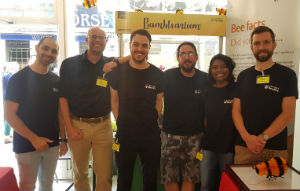Reading partners with Government to highlight bees’ needs
12 July 2019

Scientists and students at the University of Reading are campaigning alongside the UK Government this week to highlight the plight of bees and ways to save them.
Bees’ Needs Week is an annual campaign run by Defra to promote the importance of collective action to help protect pollinating insects like bees. The week was launched in Carnaby Street – renamed Carnabee Street for the week – on Monday (8 July) by Lord Gardiner, Minister for Biosecurity.
Students and academics from Reading are at the public exhibition in the street talking to members of the public about the threats faced by pollinators, and some lesser known ways we can all support them. The University’s Bumblearium has again been installed there to allow visitors to watch real bees at work.
Dr Deepa Senapathi, Research Fellow, in the University of Reading’s School of Agriculture, Policy and Development, said: “Bees’ Needs Week is a fantastic opportunity to involve the public in activities around protecting pollinators and showing them simple things we can all do to help. This is why Reading scientists are getting right behind the week to raise awareness of this major issue.
“Preventing a decline in pollinators will require action by all of us, from governments to gardeners.”
Pollinators contribute more than £500 million a year to UK agriculture and food production and are vital to the ecosystem. However, they face multiple threats, such as intensive land use, pesticides and climate change.
Reading scientists led by Professor Simon Potts, who has authored reports for the UN on the challenges faced by pollinators, are working to explore how we can support pollinators, through methods like improving land management.
These include less obvious methods such as utilising roadside verges, as well as people’s gardens and allotments, to offer pollinators safe havens within cities.
Find out more about Reading’s Bee Team >>>
Activities by other partners in Carnaby Street include a virtual reality experience inside a bumblebee nest, honey tasting and a chance to look at bee specimens up close using microscopes.
Lord Gardiner said: “Not only do bees and other pollinators contribute the equivalent of more than £500 million a year to UK agriculture and food production, they are vital to our ecosystem.
“Bees’ Needs Week urges us to do simple things such as growing more flowers and shrubs, cutting grass less often and thinking carefully about whether to use pesticides. As 2019 marks the Year of Green Action, I would encourage everyone of all ages to find new ways to connect with nature and protect our environment.”
The Bees’ Needs Week activities run in Carnaby Street from 8-14 July.
For more information on Bees’ Needs Week, events, and how you can get involved, visit https://www.bumblebeeconservation.org/bees-needs
Follow #BeesNeeds and #YearOfGreenAction on twitter to find out more about the campaign and tweet your pollinator questions to charities, businesses and bee experts.
